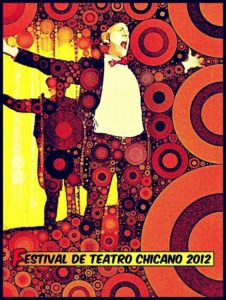(Continued from http://carlosfloresauthor.com/index.php/about/)
LJC, an NEH Fellowship to Dartmouth, and the Revista Río Bravo
 After graduating with a bachelor’s degree in literature and philosophy and a master’s in English from UTEP, I began teaching English grammar, composition, and literature courses at what was then known as Laredo Junior College, in 1971. Three years later, I received a National Endowment for the Humanities Fellowship to Dartmouth College in Hanover, New Hampshire, where I undertook a research project titled “A Chicano Looks at a Black: A Comparison and Contrast of Chicano and Black Literature.” Influenced by emergent Chicano authors at the time such as Oscar Zeta Acosta and icons of American literature such as Ralph Ellison, I returned to Laredo and began the teaching the college’s first Chicano and Black literature course. It was such a resounding success with my students that a few years later, with the support of the late Dr. José Roberto Juarez, Dean of Arts and Sciences at the time and a scholar in his own right, some of my colleagues and I hosted a number of visiting authors such as Rudolfo Anaya, Rolando Hinojosa-Smith, Dr. Carlota Cárdenas de Dwyer, José Limón, and others. That project led to the establishment of the Revista Río Bravo, where I published many of the leading lights of Chicano literature such as Rudolfo Anaya, Cecilio García Camarillo, José Flores Peregrino, Angélica Mártinez, Rolando Hinojosa-Smith, and others. However, like many such literary journals operating on a shoe-string budget, the publication lasted a mere three years, but I learned much.
After graduating with a bachelor’s degree in literature and philosophy and a master’s in English from UTEP, I began teaching English grammar, composition, and literature courses at what was then known as Laredo Junior College, in 1971. Three years later, I received a National Endowment for the Humanities Fellowship to Dartmouth College in Hanover, New Hampshire, where I undertook a research project titled “A Chicano Looks at a Black: A Comparison and Contrast of Chicano and Black Literature.” Influenced by emergent Chicano authors at the time such as Oscar Zeta Acosta and icons of American literature such as Ralph Ellison, I returned to Laredo and began the teaching the college’s first Chicano and Black literature course. It was such a resounding success with my students that a few years later, with the support of the late Dr. José Roberto Juarez, Dean of Arts and Sciences at the time and a scholar in his own right, some of my colleagues and I hosted a number of visiting authors such as Rudolfo Anaya, Rolando Hinojosa-Smith, Dr. Carlota Cárdenas de Dwyer, José Limón, and others. That project led to the establishment of the Revista Río Bravo, where I published many of the leading lights of Chicano literature such as Rudolfo Anaya, Cecilio García Camarillo, José Flores Peregrino, Angélica Mártinez, Rolando Hinojosa-Smith, and others. However, like many such literary journals operating on a shoe-string budget, the publication lasted a mere three years, but I learned much.
The South Texas Writing Project
 Another project followed years later, the South Texas Writing Project (STWP). An affiliate of the National Writing Project headquartered in Berkeley, California and modelled after the West Texas Writing Project in El Paso, where my wife, colleague Lucinda Farrokh, and I trained as directors, it addressed our students’ writing deficiencies in English. Supported by both Laredo Community College (LCC) and Texas A&M International University (TAMIU), it gathered teachers K-12 during an annual summer Institute at TAMIU, where they shared best teaching practices and developed a cadre of local teachers that would help improve the teaching of composition in English. We also saw it as an opportunity to introduce minority writers to the community. At its heart developed a thriving community of local writers who met regularly at the Café del Barrio at the home of the Chicana poet, playwright, and artist Raquel Valle Senties. Today, STWP is housed at TAMIU under new directors.
Another project followed years later, the South Texas Writing Project (STWP). An affiliate of the National Writing Project headquartered in Berkeley, California and modelled after the West Texas Writing Project in El Paso, where my wife, colleague Lucinda Farrokh, and I trained as directors, it addressed our students’ writing deficiencies in English. Supported by both Laredo Community College (LCC) and Texas A&M International University (TAMIU), it gathered teachers K-12 during an annual summer Institute at TAMIU, where they shared best teaching practices and developed a cadre of local teachers that would help improve the teaching of composition in English. We also saw it as an opportunity to introduce minority writers to the community. At its heart developed a thriving community of local writers who met regularly at the Café del Barrio at the home of the Chicana poet, playwright, and artist Raquel Valle Senties. Today, STWP is housed at TAMIU under new directors.
Teatro Chicano de Laredo
 Another project was Teatro Chicano de Laredo. While STWP was successful in many ways, it reminded us that institutional and cultural progress is slow at best. Longing for a satisfying teaching experience while in the midst of a family crisis, I thought I might do something new and exciting when Valerie Peña approached me about producing a play she wanted to write about a young Lesbian’s struggle to confront her Hispanic family about her gender; it would be titled Spaghetti is Straight Until It’s Hot. I told her that if I could gather a handful of potential playwrights and get institutional support, I would produce it. Inspired by Luis Valdez’s legendary Teatro Campesino, I managed to develop, edit, and produce forty plays about the Texas-Mexico border by local playwrights. The productions at the Laredo Little Theatre were standing-room-only successes. Today, Laurence Wensel, a graduate student at UT-Dallas, has compiled the plays, plans to write his doctoral dissertation on this unknown chapter in Chicanos’ cultural history, and hopes to publish the collection soon.
Another project was Teatro Chicano de Laredo. While STWP was successful in many ways, it reminded us that institutional and cultural progress is slow at best. Longing for a satisfying teaching experience while in the midst of a family crisis, I thought I might do something new and exciting when Valerie Peña approached me about producing a play she wanted to write about a young Lesbian’s struggle to confront her Hispanic family about her gender; it would be titled Spaghetti is Straight Until It’s Hot. I told her that if I could gather a handful of potential playwrights and get institutional support, I would produce it. Inspired by Luis Valdez’s legendary Teatro Campesino, I managed to develop, edit, and produce forty plays about the Texas-Mexico border by local playwrights. The productions at the Laredo Little Theatre were standing-room-only successes. Today, Laurence Wensel, a graduate student at UT-Dallas, has compiled the plays, plans to write his doctoral dissertation on this unknown chapter in Chicanos’ cultural history, and hopes to publish the collection soon.
Border Narrative Change, A NALAC Project
![]() Finally, Tricia Cortez, Rio Grande International Study Center Executive Director, recently invited me and a number of members of our community to participate in a project funded by a grant from the National Association of Latino Arts and Culture (NALAC), whose mission is to “support Latinx artists, cultural workers and organizations along the U.S.-Mexico border whose work challenges, shifts and transforms perceptions about the border and migration.” It is a component of the Ford Foundation’s “Reclaiming the Border Narrative” initiative, “a three-year project done in collaboration with the NALAC, National Association of Hispanic Journalists, Borealis Philanthropy and the Center for Cultural Power. It’s part of a long-term effort to penetrate attention and expand perceptions about the border region and migration, from one of chaos and danger to one in which all communities, people and cultures are understood, respected and uplifted.” I hope to contribute as a former academic, community organizer, cultural arts advocate, and author.
Finally, Tricia Cortez, Rio Grande International Study Center Executive Director, recently invited me and a number of members of our community to participate in a project funded by a grant from the National Association of Latino Arts and Culture (NALAC), whose mission is to “support Latinx artists, cultural workers and organizations along the U.S.-Mexico border whose work challenges, shifts and transforms perceptions about the border and migration.” It is a component of the Ford Foundation’s “Reclaiming the Border Narrative” initiative, “a three-year project done in collaboration with the NALAC, National Association of Hispanic Journalists, Borealis Philanthropy and the Center for Cultural Power. It’s part of a long-term effort to penetrate attention and expand perceptions about the border region and migration, from one of chaos and danger to one in which all communities, people and cultures are understood, respected and uplifted.” I hope to contribute as a former academic, community organizer, cultural arts advocate, and author.
PUBLICATIONS
Fiction:
Sex as a Political Condition: A Border Novel. Lubbock, Tx.: Texas Tech University Press, 2015.
Our House on Hueco. Lubbock, Tx.: Texas Tech University Press, 2006.
“El Subterraneo,” La Frontera. Laredo: Laredo Community College, 2003.
“Puro Tirilongo,” La Frontera. Laredo: Laredo Community College, 2002.
“Sweet Purple.” La Frontera. Laredo: Laredo Community College, 2002.
“Sex as a Political Condition.” Sin Fronteras: West Texas Writing Project Anthology. El
Paso, Texas, 1995.
“Friend of a Minor Poet. ” Texas Short Fiction: A World in Itself, Vol. I. Ed. Dr. Billy
Bob Hill. Fort Worth: ALE Publications, 1993.
“Smeltertown.” Pieces of the Heart. Ed. Gary Soto. San Francisco: Chronicle Books,
1993.
“Smeltertown.” North of the Rio Grande: the Mexican American Experience in Short
Fiction. New York, New American Library, 1991.
“Black and White,” 2nd Place in Fiction Contest, Mesa Azul Review, Albuquerque,
New Mexico, 1990.
“Cantina del Gusanito.” 1st Place in Fiction Contest. Sixteenth Chicano Literary
Contest Anthology. University of California at Irvine, 1990.
“Smeltertown,” Rio Grande Review, El Paso, Tx, 1987.
“The Red Ribbon,” Americas’ Review, Houston, Tx, 1987.
“Yellow Flowers.” Cuentos Chicanos. Albuquerque, New Mexico: University of New
Mexico Press, 1984.
“Circles.” Passing Through: An Anthology of Southwestern Writers. El Paso, Texas:
Santay Publishers, 1972.
“Boots,” Goodbye, Dove, Student Publication at UTEP, 1967.
Nonfiction:
“Preface,” Composing Ourselves: Sonnets about Teaching English Composition on the
Mexican-American Border by Randy Koch (Fithian Press 2002).
“The Final Issue–and Farewell,” Revista Rio Bravo, Vol. II, No. 2, 1982.
“A Friendship, the Canto al Pueblo, and a European Tour,” Revista Rio Bravo, Vol. II
No.1, 1982.
“Notes on Peregrino, Armas, Anaya, Pena, and Others,” Revista Rio Bravo, Vol. II, No.
1, 1982.
“El Movimiento Chicano en Laredo, Texas,” Revista Rio Bravo, Vol. I, No. 3, 1981.
“Prison, Poetry and Liberation: A Review of Raul Salinas’ Un Trip Through the Mind Jail
y Otras Excursiones,” Revista Rio Bravo, Vol. I, No. 2, 1981.
“Padre Roberto Pena–Un Sacerdote Chicano,” Revista Rio Bravo, Vol. I, No. 2, 1981.
“A Tribute to Cecilio Garcia Camarillo,” Revista Rio Bravo, Vol. I, No. 1, 1981.
“Preliminary Remarks to Laredoans,” Revista Rio Bravo, Inaugural Issue, 1980.